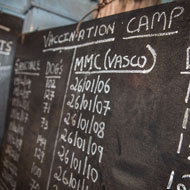
Luke Gamble reveals 20,000 dogs in Goa have been vaccinated and sterilised in six months
“Today we proved that we can achieve what others thought was impossible," said Luke Gamble, Mission Rabies CEO, as he announced that the UK-based charity has reached its ambitious target of vaccinating and sterilising more than 20,000 dogs in Goa in just six months.
"We showed the world that when we all work together, we can fight this disease – and beat it! Goa is just the beginning!"
Mr Gamble saw the devastating impact of rabies while he travelled the world as a vet. A third of all human cases of rabies are reported in India and a person dies from the disease every 30 minutes. As a result, hundreds of thousands of dogs are indiscriminately and inhumanely killed across the country every year.
Mr Gamble launched Mission Rabies in September 2013, with the initial aim of sending teams to 10 rabies hotspots in India to vaccinate 50,000 dogs in one month.
At the BSAVA Congress in April this year, Mr Gamble announced the charity's next ambitious project - to vaccinate and sterilise 70 per cent of Goa's dog population in six months. This is the percentage recommended by the World Health Organisation to prevent the spread of rabies from dog to dog or dog to person.
The Mission Rabies team set up more than 10 animal birth control clinics which carried out 700 to 800 surgeries every week. The 70 per cent vaccination rate will be maintained with mass vaccination programmes carried out in Goa in 2015 and 2016 . The ultimate aim is to eliminate rabies from the Indian state within three years.
All vaccinated and sterilised dogs are GPS tagged and post-vaccination surveys are carried out to ensure the target 70 per cent vaccination rate is achieved.
Since the launch of Mission Rabies, the team have vaccinated more than 100,000 dogs in India, performed more than 25,000 sterilisations and trained over 30 Indian veterinary surgeons in humane animal birth control methods.
In India, one child dies from rabies every hour. The majority of rabies cases are the result of dog bites in children from poor and marginal communities. Part of the aim of Mission Rabies, therefore, is to raise awareness of rabies and how to prevent dog bites. Education teams have visited schools across India to deliver a fun, easy to understand education programme, successfully making over 100,000 children "rabies aware".
During the initial programme, the team picked up an average of three to four rabid dogs each week, which were reported by members of the public via the "rabies hotline". This is the first time rabies prevalence has ever been recorded in India.
New projects will be launched next year in Malawi, Nepal, Sri Lanka and Ethiopia.
Image courtesy of Mission Rabies.



 The Veterinary Medicines Directorate (VMD) is inviting applications from veterinary students to attend a one-week extramural studies (EMS) placement in July 2026.
The Veterinary Medicines Directorate (VMD) is inviting applications from veterinary students to attend a one-week extramural studies (EMS) placement in July 2026.